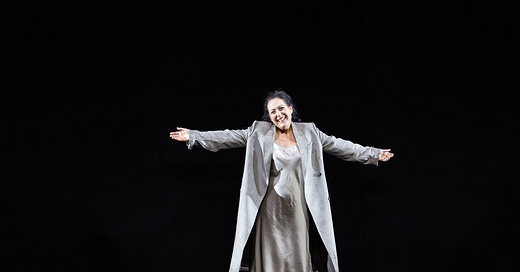Straussbonanza in Munich and Berlin
Claus Guth Munich's brings Die Liebe der Danaë triumphantly back to the National-Theatre, while Tobias Kratzer gives the Deutsche Oper a Frau ohne Schatten lacking mystery and magic
Triumphant stand-in: Manuela Uhl (Danaë) acknowledges the grateful applause of Munich’s first night audience at curtain down Picture © Geoffroy Schied
For British fans of Richard Strauss, UK opera companies offer thin pickings. Neither of London’s two main houses, the Royal Opera at Covent Garden and English National Opera at the Coliseum, has programmed Strauss this season. The Royal Opera has not even presented the composer’s most popular title, Der Rosenkavalier, since 2016, when it appeared in a staging unlikely to be revived. Outside the capital, the situation is closer to once-in-a-blue-moon territory.
Even in Germany, Strauss’s less familiar music dramas struggle to fill theatres, but the prospect of a ‘Straussbonanza’ drew me to Munich and Berlin this month for new productions respectively of Die Liebe der Danaë at the Bavarian State Opera and Die Frau ohne Schatten at the Deutsche Oper. And there was a bonus in the form of a revival at Berlin’s Staatsoper of Patrice Chéreau’s staging of Elektra, originally seen at Aix-en-Provence in 2013.
Munich’s Danaë was especially enticing since it offered, in the title role, the glamorous Swedish soprano Malin Byström, London’s triumphant Salome in 2018 and 2022. This was, for her, a new Strauss role, in one of his most rarely staged operas. A late work, written just before its more widely performed successor, Capriccio, it had a troubled gestation from the start. Conceived in 1920 by Strauss’s favourite librettist, Hugo von Hofmannsthal, as a light-hearted mythological operetta after the manner of Offenbach, the project was abandoned when Die Frau ohne Schatten more-or-less bombed at the Vienna State Opera in 1919.
Keep reading with a 7-day free trial
Subscribe to Operalogue to keep reading this post and get 7 days of free access to the full post archives.




